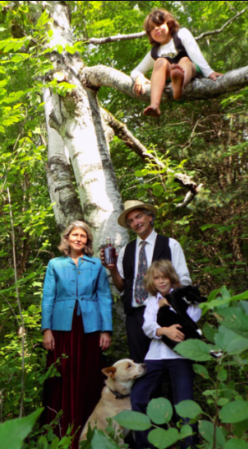
TEMPLE – As the season of melting approaches, tappers everywhere are preparing buckets, lines and boilers for the sweetest sign of spring: sap. And while most people will head to the maple for their syrup fix, the Dennison/Romanyshyn family will be returning to their 40-plus acres of birch trees for a seventh year of production.
The tradition of collecting birch sap has been around for centuries in places like Ukraine and Russia. Most often the mineral-rich water is boiled down to syrup form, but it is also common practice to simply drink the sap, or use it to create a fermented drink.
Here in North America, birch has caught on in popularity primarily in Alaska and Canada, only reaching the northern region of the United States in more recent years.
“I knew about birch from traveling,” Michael Romanyshyn said.
Romanyshyn said as far as he knows the Temple Tappers are the only birch syrup producers in Maine, and one of a handful in New England. The family-run business puts out roughly 2,000 taps hooked to a line system that pumps the sap to their sugar house for boiling and bottling. Not recommended for pancakes and waffles, birch syrup is usually used in baking or as a glaze on salmon or vegetables. The Temple Tappers have a following of birch syrup enthusiasts, and sell at a few locations throughout Maine as well as the annual Common Ground Fair.
Despite being relatively small in the world of syrup production, the Temple Tappers were awarded first place for taste at the First International Birch Sap and Syrup Conference hosted by Paul Smith’s College four years ago. The conference brought together birch tappers from across the region, including long-time producers Kahiltna Birchworks.
“Not having won too many awards in my life, that was pretty exciting. It gave us the enthusiasm, knowing that we had made something pretty good,” he said.
Romanyshyn and his wife Susie Dennison have continued to tweak and adapt their process as they learned more and more about the niche gourmet product. Details like where to place taps, when to get started and how long to boil have all contributed to the award winning flavor.
“There’s an art to it. Birch sap is finicky,” Romanyshyn said.
From the “black sludge” of their first ever boil, to the delicate, “woodsy” bottles the Temple Tappers are now putting out, Romanyshyn said they still have a lot to learn. The couple wants to do more experimenting with fermentation, and with the collection system itself. Birch trees prefer an “open flow” Romanyshyn said, meaning the bigger the tubing system the more sap, and where maple trees benefit from gravity-fed tubing, birch trees pressurize their sap into a center column which then gets pushed up and out of the tree. While there are some similarities between maple and birch, the process of collection has some important differences.
As well as continuing to adjust their own production, Romanyshyn said they hope to see some change at a state level too.
“Maine will never compete with Vermont on maple syrup. But nobody is doing birch yet aside from Alaska,” he said.
In his theory, with monetary and marketing support from the state, Maine could take the lead in the world of birch production.
“It’s an opportunity, and it’s one that creates another way to not cut down trees,” he said.
Temple Tappers Birch Syrup can be bought at Up Front and Pleasant and Calzolaio’s Pasta Co. For more information call 778-2513.





Very Interesting! I had no idea that this was a thing. I’ll be buying some soon to try it. Nice article, and best of luck!
I don’t know how much it has changed since I tasted Temple Tappers product about 5 years ago, but it was definitely …. different. I think it is an acquired taste!
I would like to see someone make a flavoring for soda or manufacture Birch Beer soft drink. Hopefully Mike and Susie. But also would like to see them expand their soda line and tap fruit trees to make apple and cherry flavors too. The cooking process would be a little different when making it for flavoring I believe,but it has been done before. I can imagine an all natural soda pop coming from Temple. No artificial sweeteners,no preservatives,and no high fructose corn syrup.
Loved the article. I wonder how it works for medicinal use. Love seeing my Temple neighbors promoting a very unique and rewarding business! Good luck in the future!
Good luck to the Temple Tappers! All the best to you, Susie and Michael!
Intriguing! Have you tried adding your syrup to Sodastrram home bubble water for homemade quick Birch soda/beer?